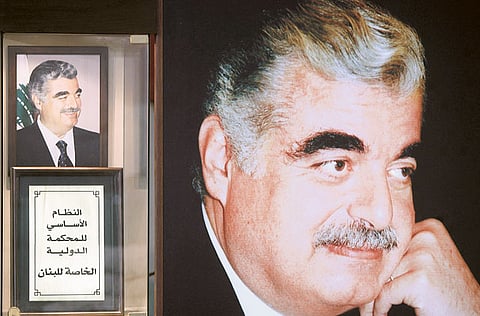Hariri tribunal a political tool
Every member of Lebanon's new government should reject foreigners raking up six-year-old cinders

Once again Lebanon stands at a dangerous crossroads. Leaks concerning indictments to be issued by the Special Tribunal for Lebanon have resulted in the collapse of the 14-month-old unity government following resignations by 11 ministers from Hezbollah and its allies who believe the Tribunal is nothing more than a US-driven piece of political theatre.
Going by the Tribunal's sorry record and the way the White House has been leaning on Lebanon's caretaker prime minister Sa'ad Hariri to accept its findings, those who accuse the Tribunal of political bias may be justified.
Jointly set up by the Lebanese Republic and the UN to investigate the 2005 killing of former Lebanese prime minister Rafik Hariri, the Tribunal has enjoyed little credibility since it officially opened on March 1, 2009.
In the first place, any quest for so-called justice should have been tempered by the need for unity within one of the most politically fragile Arab countries. Let's suppose those pointing their fingers at Hariri's murderers, whoever they may be, are right.
If getting the suspects to The Hague is going to trigger another civil war, surely even Sa'ad Hariri, who wants his father's killers brought to justice, should consider whether it was worth it.
It seems to me astonishing that former Lebanese prime minister Fouad Siniora blessed what is, in fact, a breach of Lebanon's sovereignty. By handing over jurisdiction to a foreign court of the type that usually deals with war crimes and crimes against humanity, he not only undermined his country's own police forces and judiciary but also cast aspersions on his government's ability to effectively govern.
Certainly, the Egyptian government didn't ask for the UN's help following the assassination of Anwar Sadat. Moreover, under Lebanese constitution, the premier had no right to consent to the Tribunal without the ratification of parliament which was not sought.
Costly investigation
Even more astonishing is that the UN agreed to involve itself in a very costly and time-consuming investigation into the murder of one individual. There is no precedent for this, which leaves the more sceptical among us wondering what the pay-off could be for those UN member countries which supported it.
Actually, it's not that difficult to work-out as there has already been a substantial pay-off. The UN-authorised Mehlis Report launched in accordance with UN Security Council Resolution 1595 linked high-ranking Syrian government and military officials to the crime, including the Syrian president's brother Maher Al Assad.
However, one of the chief witnesses recanted his testimony, saying he had been tortured and bribed by certain Lebanese parties to bear false witness against Syria. Another witness was found to be unreliable.
Syria has since been vindicated and, in September, Sa'ad Hariri admitted mistakes "that harmed the Syrian people and relations between the two countries… this was a political accusation, and this political accusation has finished."
If Hariri recognises that the accusations against Syria were politically-driven, then it's hardly a step too far to imagine that any accusations against Hezbollah or Iran's Supreme Leader may be cut from the same cloth.
Anything that discredits Hezbollah or its supporter Tehran enforces the contention of Washington and Tel Aviv that Hezbollah is a terrorist organisation backed by a terrorist-supporting state.
Such demonising tactics on the part of Western powers have been par for the course over the last decade as we witnessed in the run-up to the invasions of Afghanistan and Iraq when both the Taliban and Saddam Hussain were dehumanised.
There is no doubt that Hezbollah's military wing is a thorn in Israel's side. It not only prevents it from pacifying Lebanon but is also a well-armed deterrent against any Israeli ambitions to bomb Iran's nuclear facilities as Hezbollah is known to have missiles capable of hitting Tel Aviv.
Hezbollah's leader Hassan Nasrallah has vehemently denied any involvement in Hariri's death and has come up with evidence that could implicate Israel. He produced footage of Israeli spy planes tracking routes used by Hariri around Lebanon and Hezbollah has since discovered Israeli spy cameras hidden in the mountains overlooking Beirut.
In recent times, there have been numerous Israeli spy rings found operating in Lebanon, yet the Tribunal doesn't appear to have taken any of this circumstantial evidence into account.
Lastly, for some strange reason, Sa'ad Hariri has ignored Nasrallah's demand that the two false witnesses be handed over to Lebanon's judiciary to be tried so that the Lebanese people can know why the lies were cooked up and, more crucially, by whom.
The future of Lebanon would be better served if the page was turned on the tragic death of Hariri. Every member of Lebanon's new government should reject foreigners raking up six-year-old cinders that could so easily flare into a conflagration.
Sadly, nothing can bring Hariri back but wise leadership and compromise on the part of the March 8 and March 14 alliances could bring Lebanon back from the brink.
Linda S. Heard is a specialist writer on Middle East affairs. She can be contacted at lheard@gulfnews.com Some of the comments may be considered for publication.


